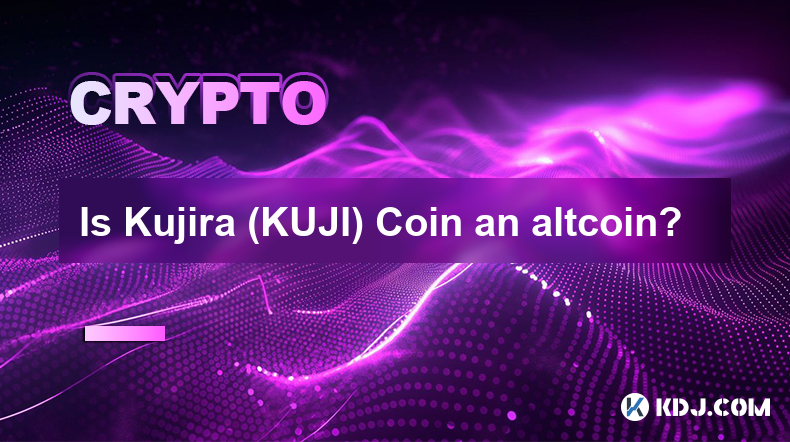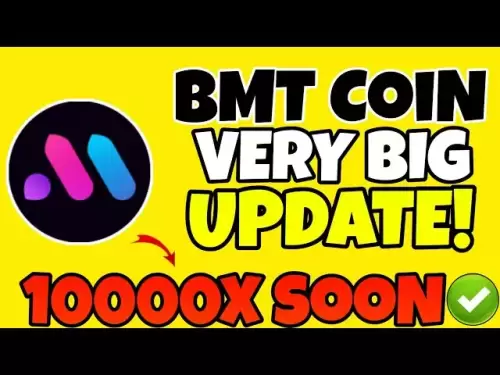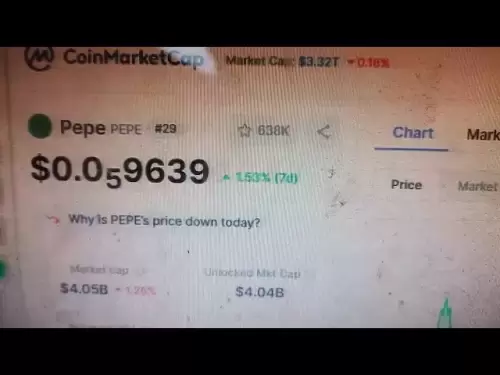-
 Bitcoin
Bitcoin $108,151.9523
0.11% -
 Ethereum
Ethereum $2,520.6389
0.26% -
 Tether USDt
Tether USDt $1.0002
0.00% -
 XRP
XRP $2.2654
2.16% -
 BNB
BNB $656.3481
0.23% -
 Solana
Solana $148.3243
0.26% -
 USDC
USDC $1.0000
0.00% -
 TRON
TRON $0.2847
0.24% -
 Dogecoin
Dogecoin $0.1655
1.16% -
 Cardano
Cardano $0.5789
1.10% -
 Hyperliquid
Hyperliquid $38.9650
-0.58% -
 Sui
Sui $2.8914
-0.61% -
 Bitcoin Cash
Bitcoin Cash $487.4743
1.11% -
 Chainlink
Chainlink $13.2128
0.30% -
 UNUS SED LEO
UNUS SED LEO $9.0219
-0.03% -
 Avalanche
Avalanche $17.9307
0.73% -
 Stellar
Stellar $0.2400
1.57% -
 Toncoin
Toncoin $2.9074
6.15% -
 Shiba Inu
Shiba Inu $0.0...01162
1.83% -
 Litecoin
Litecoin $87.2310
1.00% -
 Hedera
Hedera $0.1550
0.24% -
 Monero
Monero $314.8034
0.95% -
 Dai
Dai $1.0000
0.00% -
 Polkadot
Polkadot $3.3587
0.34% -
 Ethena USDe
Ethena USDe $1.0002
0.00% -
 Bitget Token
Bitget Token $4.3862
-0.27% -
 Uniswap
Uniswap $7.2908
4.86% -
 Pepe
Pepe $0.0...09825
1.65% -
 Aave
Aave $271.1484
-0.22% -
 Pi
Pi $0.4517
-1.99%
Is Kujira (KUJI) Coin an altcoin?
As an altcoin built on Cosmos, Kujira (KUJI) offers DeFi-focused services and governance participation, differentiating itself from Ethereum-based counterparts and showcasing innovative blockchain applications.
Dec 27, 2024 at 07:26 am

Key Points
- Definition of an altcoin
- Characteristics of Kujira (KUJI)
- Comparison to other cryptocurrencies
- Market performance and potential of KUJI
- FAQs on KUJI coin and altcoins
Is Kujira (KUJI) Coin an Altcoin?
What is an Altcoin?
An altcoin (alternative coin) refers to any cryptocurrency that is not Bitcoin. Altcoins emerged as alternatives to Bitcoin, offering unique features, technologies, or use cases. They aim to address specific market needs or limitations of Bitcoin, attracting investors with diverse investment strategies.
Characteristics of Kujira (KUJI)
Kujira (KUJI) is a decentralized finance (DeFi) platform built on the Cosmos network. It provides various DeFi services, including borrowing, lending, and staking. KUJI coin is the native token of the Kujira platform, serving as a medium of exchange, governance token, and incentive for liquidity providers.
- DeFi Focus: KUJI is primarily focused on DeFi applications, differentiating it from cryptocurrencies with broader use cases.
- Blockchain Agnostic: Built on Cosmos, KUJI is interoperable with other Cosmos-based projects, facilitating asset exchange and cross-chain transactions.
- Governance Participation: KUJI holders have voting rights on key platform decisions, empowering them to shape the future of the project.
Comparison to Other Cryptocurrencies
While KUJI can be considered an altcoin, it differs from other cryptocurrencies in several ways:
- Ethereum Compatibility: Unlike many altcoins based on Ethereum, KUJI runs on Cosmos, enabling lower transaction fees and faster processing times.
- DeFi Utility: KUJI is designed specifically for DeFi use cases, while many altcoins have broader applications as a currency, payment method, or store of value.
- Community-Driven Development: KUJI is driven by a community of users and developers, contributing to its ongoing development and ecosystem growth.
Market Performance and Potential of KUJI
KUJI coin has experienced significant market fluctuations, influenced by market conditions and platform advancements. Its performance is tied to the adoption and usage of the Kujira platform's DeFi services.
- Strong User Base: Kujira boasts a growing user base, indicating increasing adoption of its DeFi offerings.
- Partnerships and Integrations: Collaborations with projects such as Osmosis and Secret Network expand KUJI's reach and interoperability.
- Development Roadmap: The Kujira team has outlined an ambitious roadmap for platform enhancements and new features, driving investor interest.
FAQs on KUJI Coin and Altcoins
What are the benefits of investing in altcoins?
- Diversification: Investing in a range of altcoins can reduce portfolio risk.
- Innovation: Altcoins often showcase innovative technologies and features not found in Bitcoin.
- Potential Growth: Some altcoins have the potential for significant returns if their projects succeed.
What are the risks of investing in altcoins?
- Volatility: Altcoins are generally more volatile than Bitcoin and traditional investments.
- Market Manipulation: Smaller market caps make altcoins more susceptible to price manipulation.
- Development Risks: Ongoing development and competition can affect altcoin prices.
How do I choose the right altcoins to invest in?
- Research: Thoroughly understand the project, team, and technology behind each altcoin.
- Consider Use Case: Identify altcoins that address specific market needs or solve real-world problems.
- Market Analysis: Analyze market trends, volume, and price action to inform investment decisions.
Disclaimer:info@kdj.com
The information provided is not trading advice. kdj.com does not assume any responsibility for any investments made based on the information provided in this article. Cryptocurrencies are highly volatile and it is highly recommended that you invest with caution after thorough research!
If you believe that the content used on this website infringes your copyright, please contact us immediately (info@kdj.com) and we will delete it promptly.
- Litecoin Breakout Watch: What Traders Need to Know Now
- 2025-07-06 16:50:13
- Bitcoin, Solana, Ethereum: Decoding the Latest Buzz on the Blockchain
- 2025-07-06 16:50:13
- Widnes Resident's 50p Could Be Your Ticket to Easy Street: Rare Coin Mania!
- 2025-07-06 16:55:13
- Bitcoin, Solaris Presale, and Token Rewards: What's the Buzz?
- 2025-07-06 16:55:13
- Ethereum Under Pressure: Price Drop Amid Global Uncertainties
- 2025-07-06 17:00:13
- XRP, SEC Case, and Prosperity: A New Era for XRP Holders?
- 2025-07-06 17:10:13
Related knowledge

How to customize USDT TRC20 mining fees? Flexible adjustment tutorial
Jun 13,2025 at 01:42am
Understanding USDT TRC20 Mining FeesMining fees on the TRON (TRC20) network are essential for processing transactions. Unlike Bitcoin or Ethereum, where miners directly validate transactions, TRON uses a delegated proof-of-stake (DPoS) mechanism. However, users still need to pay bandwidth and energy fees, which are collectively referred to as 'mining fe...

USDT TRC20 transaction is stuck? Solution summary
Jun 14,2025 at 11:15pm
Understanding USDT TRC20 TransactionsWhen users mention that a USDT TRC20 transaction is stuck, they typically refer to a situation where the transfer of Tether (USDT) on the TRON blockchain has not been confirmed for an extended period. This issue may arise due to various reasons such as network congestion, insufficient transaction fees, or wallet-rela...

How to cancel USDT TRC20 unconfirmed transactions? Operation guide
Jun 13,2025 at 11:01pm
Understanding USDT TRC20 Unconfirmed TransactionsWhen dealing with USDT TRC20 transactions, it’s crucial to understand what an unconfirmed transaction means. An unconfirmed transaction is one that has been broadcasted to the blockchain network but hasn’t yet been included in a block. This typically occurs due to low transaction fees or network congestio...

How to check USDT TRC20 balance? Introduction to multiple query methods
Jun 21,2025 at 02:42am
Understanding USDT TRC20 and Its ImportanceUSDT (Tether) is one of the most widely used stablecoins in the cryptocurrency market. It exists on multiple blockchain networks, including TRC20, which operates on the Tron (TRX) network. Checking your USDT TRC20 balance accurately is crucial for users who hold or transact with this asset. Whether you're sendi...

What to do if USDT TRC20 transfers are congested? Speed up trading skills
Jun 13,2025 at 09:56am
Understanding USDT TRC20 Transfer CongestionWhen transferring USDT TRC20, users may occasionally experience delays or congestion. This typically occurs due to network overload on the TRON blockchain, which hosts the TRC20 version of Tether. Unlike the ERC20 variant (which runs on Ethereum), TRC20 transactions are generally faster and cheaper, but during...

The relationship between USDT TRC20 and TRON chain: technical background analysis
Jun 12,2025 at 01:28pm
What is USDT TRC20?USDT TRC20 refers to the Tether (USDT) token issued on the TRON blockchain using the TRC-20 standard. Unlike the more commonly known ERC-20 version of USDT (which runs on Ethereum), the TRC-20 variant leverages the TRON network's infrastructure for faster and cheaper transactions. The emergence of this version came as part of Tether’s...

How to customize USDT TRC20 mining fees? Flexible adjustment tutorial
Jun 13,2025 at 01:42am
Understanding USDT TRC20 Mining FeesMining fees on the TRON (TRC20) network are essential for processing transactions. Unlike Bitcoin or Ethereum, where miners directly validate transactions, TRON uses a delegated proof-of-stake (DPoS) mechanism. However, users still need to pay bandwidth and energy fees, which are collectively referred to as 'mining fe...

USDT TRC20 transaction is stuck? Solution summary
Jun 14,2025 at 11:15pm
Understanding USDT TRC20 TransactionsWhen users mention that a USDT TRC20 transaction is stuck, they typically refer to a situation where the transfer of Tether (USDT) on the TRON blockchain has not been confirmed for an extended period. This issue may arise due to various reasons such as network congestion, insufficient transaction fees, or wallet-rela...

How to cancel USDT TRC20 unconfirmed transactions? Operation guide
Jun 13,2025 at 11:01pm
Understanding USDT TRC20 Unconfirmed TransactionsWhen dealing with USDT TRC20 transactions, it’s crucial to understand what an unconfirmed transaction means. An unconfirmed transaction is one that has been broadcasted to the blockchain network but hasn’t yet been included in a block. This typically occurs due to low transaction fees or network congestio...

How to check USDT TRC20 balance? Introduction to multiple query methods
Jun 21,2025 at 02:42am
Understanding USDT TRC20 and Its ImportanceUSDT (Tether) is one of the most widely used stablecoins in the cryptocurrency market. It exists on multiple blockchain networks, including TRC20, which operates on the Tron (TRX) network. Checking your USDT TRC20 balance accurately is crucial for users who hold or transact with this asset. Whether you're sendi...

What to do if USDT TRC20 transfers are congested? Speed up trading skills
Jun 13,2025 at 09:56am
Understanding USDT TRC20 Transfer CongestionWhen transferring USDT TRC20, users may occasionally experience delays or congestion. This typically occurs due to network overload on the TRON blockchain, which hosts the TRC20 version of Tether. Unlike the ERC20 variant (which runs on Ethereum), TRC20 transactions are generally faster and cheaper, but during...

The relationship between USDT TRC20 and TRON chain: technical background analysis
Jun 12,2025 at 01:28pm
What is USDT TRC20?USDT TRC20 refers to the Tether (USDT) token issued on the TRON blockchain using the TRC-20 standard. Unlike the more commonly known ERC-20 version of USDT (which runs on Ethereum), the TRC-20 variant leverages the TRON network's infrastructure for faster and cheaper transactions. The emergence of this version came as part of Tether’s...
See all articles

























































































